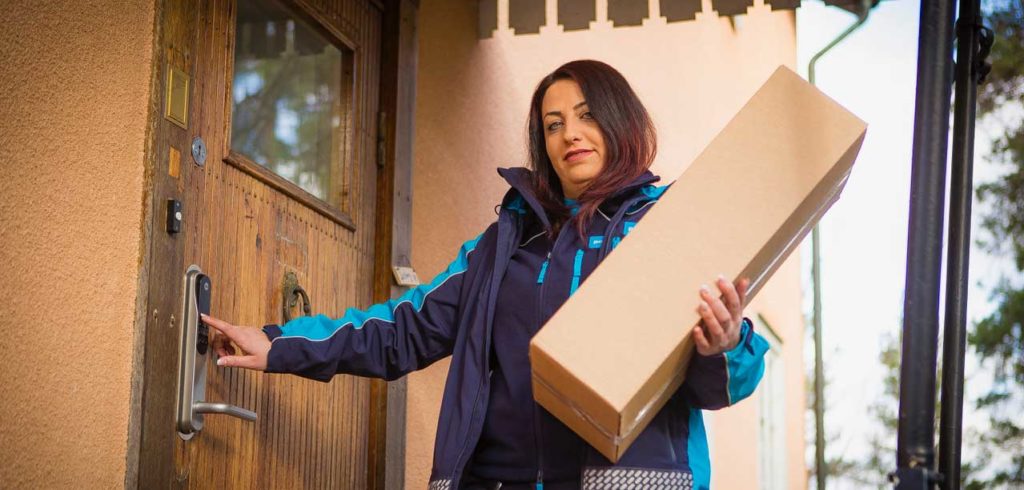Amazon has announced new delivery options, including in-garage delivery. Can delivery companies keep up? Will customers accept strangers accessing their home or garage? Analysis from Marek Różycki (Last Mile Experts) and Ian Kerr (Postal Hub Podcast)
Amazon has unveiled its latest technological advance toward guaranteed first-time delivery under the ‘Key by Amazon’ service (read the story here). With this latest advance, Amazon customers will be able to use their garage as a delivery point, as well as grant access to their home remotely. The new products also integrate with Ring smart security solutions.
Delivery to the garage
With ‘Key for Garage’, Amazon customers can monitor and control their garage door via the Key app thanks to integration with connected technology from access control company CGI. In-garage delivery will be available in 37 US cities.
“[The] garage offers a convenient destination for delivery hurdles such as potential theft and missed deliveries,” says Jeff Meredith, CGI president and chief operating officer.
Remote visibility via Ring
Customers with Ring video doorbells will be able to lock and unlock their Key-compatible smart locks directly from the live feed of their camera in the Ring app.
“With the integration of Key, [customers will] be able to use the Ring app to open the door to neighbors, family, and service providers they do want coming and going, no matter where they are,” comments Jamie Siminoff, chief inventor and founder of Ring.
Technology for delivery drivers
‘Key for Business’ is a smart fob for delivery drivers. The technology allows building owners and managers to give controlled remote access to delivery drivers to drop off packages to their residents. ‘Key for Business’ works with most building access systems and is currently available to hundreds of buildings across the USA.
Cost to the customer
The technology isn’t free, but is priced attractively compared to some of the standalone tech-heavy home parcel lockers that have been launched in recent years.
What are the challenges?
Amazon Key and similar products will be less relevant to multi-person dwellings, where residential parcel lockers would be more effective. Having said that, a concierge’s room can be made into a large ‘leave safe’ area with this kind of technology.
According to Swedish lock manufacturer Assa Abloy’s head of smart residential Martin Huddart, older, more affluent customers in private residences are likely to be less open to this technology.
Having said that, people who have piloted Assa Abloy’s smart locks for delivery rapidly become believers. “Pilot customers like it and when they realize the benefits, they quickly become advocates,” he says.
Local cultural differences come into play as well when it comes to trusting a delivery driver to access the home when delivering a parcel.
Are there any challengers to Amazon?
Amazon has been making all the headlines over the last 12 months, despite the pioneering work done by companies such as PostNord. Google has its Nest technology and could conceivably catch up with an offering for commercial carriers and postal operators.
Another in-home delivery option making headlines lately is from eDOR, which enables deliveries ‘within’ the door. With eDOR, a special door is installed at the customer’s home, which includes parcel receptacles that can be unlocked via NFC on mobile devices. The product is yet to be officially launched, whereas Amazon’s products are on the market now.
Conclusion
“Looking at it from the perspective of the world’s largest lock company, as e-commerce grows, the friction in the last mile can be eliminated,” says Assa Abloy’s Huddart.
We agree – what more could customers want than a secure, first-time delivery to their residential address? Especially without having to purchase a separate secure parcel delivery box or a modified front door.
We particularly like the opportunity of making an existing asset such as a garage, shed or porch into a safe and large ‘personal locker’. The alternative of direct access to the customer’s home may take time to catch on, and might never be accepted in some areas.
Amazon is not the only player in this space. If others such as Google (Nest) also move forward at this pace, customer experience in the last mile will be vastly improved. Let’s see where this takes us, but these small gadgets may be a big step forward in last-mile technology.
Join the conversation online at LinkedIn by clicking our LinkedIn profiles below and tell us what you think.
Bio:

Marek Różycki is managing partner at Last Mile Experts, specializing in CEP and e-commerce last-mile advisory.
 Ian Kerr is the founder and host of the Postal Hub Podcast, the weekly podcast for the postal and delivery sectors.
Ian Kerr is the founder and host of the Postal Hub Podcast, the weekly podcast for the postal and delivery sectors.


